 |
David M. Cutler, PhD Dr. Cutler has developed an impressive record of achievement in both academia and the public sector. He served as Assistant Professor of Economics from 1991 to 1995, was named John L. Loeb Associate Professor of Social Sciences in 1995, and received tenure in 1997 at Harvard University. He is currently the Otto Eckstein Professor of Applied Economics in the Department of Economics and holds secondary appointments at the Kennedy School of Government and the School of Public Health. Professor Cutler was associate dean of the Faculty of Arts and Sciences for Social Sciences from 2003-2008. Honored for his scholarly work and singled out for outstanding mentorship of graduate students, Professor Cutler's work in health economics and public economics has earned him significant academic and public acclaim. Professor Cutler served on the Council of Economic Advisers and the National Economic Council during the Clinton Administration and has advised the Presidential campaigns of Bill Bradley, John Kerry, and Barack Obama as well as being Senior Health Care Advisor for the Obama Presidential Campaign. Among other affiliations, Professor Cutler has held positions with the National Institutes of Health and the National Academy of Sciences. Currently, Professor Cutler is a Research Associate at the National Bureau of Economic Research, a member of the Institute of Medicine, and a Fellow of the Employee Benefit Research Institute. He advises many companies and groups on health care. Professor Cutler was a key advisor in the formulation of the recent cost control legislation in Massachusetts, and is one of the members of the Health Policy Commission created to help reduce medical spending in that state. Professor Cutler is author of two books, several chapters in edited books, and many of published papers on the topic s of health care and other public policy topics. Author of Your Money Or Your Life: Strong Medicine for America's Health Care System, published by Oxford University Press, this book, and Professor Cutler's ideas, were the subject of a feature article in the New York Times Magazine, The Quality Cure, by Roger Lowenstein. Cutler was recently named one of the 30 people who could have a powerful impact on healthcare by Modern Healthcare magazine and one of the 50 most influential men aged 45 and younger by Details magazine. Professor Cutler received an AB from Harvard University (1987) and a PhD in Economics from MIT (1991).
|
||
| Ceci Connolly Ceci Connolly is the Managing Director of the Health Research Institute at PwC, a research organization dedicated to objective analysis on the issues, policies and trends important to health organizations and policymakers. Ms. Connolly is a veteran journalist, author and commentator who spent 25 years in the news business, reporting on national politics, health care, Latin America and natural disasters such as Hurricane Katrina. As the national health correspondent for the Washington Post, she chronicled enactment of the Affordable Care Act and was co-author of Landmark: The Inside Story of America's New Health Care Law and What It Means for Us All. During her years in journalism, she reported on six U.S. presidential campaigns and was a major contributor to the book Deadlock: The Inside Story of America's Closest Election. She spent more than two years based in Mexico City, traveling extensively throughout Latin America. She produced a daily blog on Mexico's 2006 presidential race, as well as a multimedia project on HIV-AIDS along the U.S.-Mexico border. Ms. Connolly is a board member for the non-profit Whitman Walker Health, and is the first non-physician to receive the Mayo Clinic's prestigious Plummer Society Award for promoting deeper understanding of science and medicine. She also serves on the National Advisory Board of the Center for Sustainable Health Spending and was the recipient of a fellowship at Harvard's Kennedy School of Government. She has appeared on PBS' Washington Week, The Early Show on CBS, NPR's Diane Rehm Show and several news programs on MSNBC and the Fox News Channel. She has spoken at the prestigious National Press Club, the Chautauqua Institution, the Cleveland Clinic, numerous universities and health care conferences. Prior to joining PwC, Ms. Connolly was a senior adviser at the McKinsey Center for Health Reform. In her role at the Health Research Institute, Ms. Connolly oversees a team of independent analysts and writers who track major developments across the health care spectrum.
|
|||
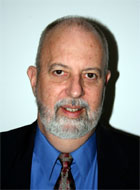 |
Thomas E. Getzen, PhD Thomas Getzen is Executive Director of iHEA, the International Health Economics Association, with 2400 academic and professional members in 72 countries (www.healtheconomics.org) and emeritus Professor of Risk, Insurance and Health Management at the Fox School of Business, Temple University, and has been visiting professor at the University of Toronto, the Woodrow Wilson School of Public Policy at Princeton University, the Wharton School of the University of Pennsylvania, and the Centre for Health Economics at the University of York. His textbook Health Economics: Fundamentals and Flow of Funds (Wiley; 4th ed., 2010) is used in graduate and undergraduate programs throughout the world. His research and consulting focus on the macroeconomics of health, forecasting medical expenditures, physician supply, price indexes, financing, and public health economics. He is the editor-in-chief for the "HEN-Health Economics Network" in collaboration with SSRN, associate editor for Health Economics, and a reviewer for a number of medical, health services, and economics journals. Professor Getzen periodically updates the forecasting model of "Long Run Medical Cost Trends" for the Society of Actuaries, and currently serves on the National Academy of Sciences IOM Committee on Public Health Strategies.
|
||
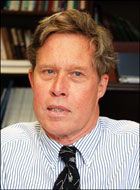 |
John F. Holahan, Ph.D. John Holahan is an Institute Fellow at The Urban Institute's Health Policy Center. Much of his research has focused on state health policy, including Medicaid and issues of federalism and health. These include analyses of the recent growth in Medicaid expenditures and the implications of block grants and changes in matching formulas on states. He has also published on strategies for Medicaid reform. He has developed proposals for health system reform, most recently in Massachusetts. He has also published research on the reasons for the growth in the uninsured over the past decade and on the effects of proposals to expand health insurance coverage on the number of uninsured and the cost to federal and state governments.
|
||
 |
Joanne Kenen Joanne Kenen is the health care editor. Kenen has covered everything from Haitian voodoo festivals to U.S. presidential campaigns. (Sometimes it’s hard to tell the difference.) Since arriving in Washington in 1994, she has focused on health policy and health politics. She joined POLITICO in Sept. 2011. Kenen got the newspaper bug in second grade (the Teeny Town News), spent way too much time at the Harvard Crimson and then found herself in Central America, where she had an Inter American Press Association fellowship. She worked for Reuters in New York, Florida and the Caribbean and Washington. As a Kaiser Family Foundation media fellow in 2006-07, she wrote about aging and palliative care. She spent three years writing and blogging about health policy at the nonpartisan New America Foundation. Her work has appeared in numerous publications including The Atlantic, Kaiser Health News, the Washingtonian, CQ, The Washington Post, the Center for Public Integrity, Health Affairs, AARP’s The Magazine and Bulletin, National Journal, Slate and Miller-McCune. She co-authored two books that have absolutely nothing to do with health: “The Costa Rica Reader” and a parenting book, “The Sleep Lady’s Good Night, Sleep Tight.” One was adopted in college courses. The other one made money. When she isn’t busy trying to figure out what Congress is up to (not that Congress always knows what Congress is up to), she can be found in Bethesda, Md., with her husband, Ken Cohen, and their two sons. When she needs a break from health policy, she writes about her kids, chocolate cake or cross-dressing female pirates.
|
||
 |
Maya MacGuineas Maya MacGuineas is the President of the Committee for a Responsible Federal Budget. Maya testifies regularly before Congress and has published broadly, including articles in The Atlantic Monthly, The Washington Post, The New York Times, the Financial Times and the Los Angeles Times. Once dubbed "an anti-deficit warrior" by The Wall Street Journal, Ms. MacGuineas comments often on broadcast news and is widely cited by the national press. In the spring of 2009 she did a stint on The Washington Post editorial board, covering economic and fiscal policy. Ms. MacGuineas has worked at the Brookings Institution and on Wall Street. As a political independent, she has advised numerous candidates for office from both parties, and works regularly with members of Congress on health, economic, tax, and budget policy. She serves on the boards of a number of national, nonpartisan organizations and received her Master in Public Policy from the John F. Kennedy School of Government at Harvard University.
|
||
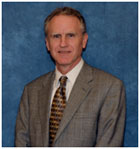 |
Charles Roehrig Dr. Roehrig is a Vice President and Institute Fellow who directs Altarum's Center for Sustainable Health Spending . His research interests include timelier tracking of health spending, determining its sustainable growth rate, and modeling its future growth. He has overseen development of the Altarum Health Sector Economic Indicators, which provide monthly tracking of health spending, prices, utilization, and employment. He developed the Triangle of Painful Choices to illustrate the link between the federal budget and the sustainable rate of health spending. He also led the development of estimates of national health spending by medical condition (including spending on prevention) and has extended this research to include the impact of disease prevalence on expenditure growth. He is currently studying the impact of primary prevention on health spending and is modeling the impact of business cycles on health spending growth. He also has many years of experience in modeling health workforce supply and requirements. His work has been published in Health Affairs and the New England Journal of Medicine and he blogs regularly for Altarum's Health Policy Forum and Health Affairs. In addition to his applied research, he has published in the field of theoretical econometrics in academic journals such as Econometrica and the Journal of Econometrics. Dr. Roehrig holds a PhD in economics from the University of Michigan, a master of science degree in statistics from the University of Michigan, and a bachelor of arts degree in economics from Amherst College.
|
||
 |
Uwe E. Reinhardt Dr. Reinhardt is recognized as one of the nation's leading authorities on health care economics. He is the James Madison Professor of Political Economy and Professor of Economics and Public Affairs at Woodrow Wilson School of Public and International Affairs at Princeton University. He has been a member of the Institute of Medicine of the National Academy of Sciences since 1978. He is a past president of the Association of Health Services Research. From 1986 to 1995 he served as a commissioner on the Physician Payment Review Committee, established in 1986 by Congress to advise it on issues related to the payment of physicians. He is a senior associate of the Judge Institute for Management of Cambridge University, UK, and a trustee of Duke University, and the Duke University Health System. Dr. Reinhardt is or was a member of numerous editorial boards, among them the Journal of Health Economics, the Milbank Memorial Quarterly, Health Affairs, the New England Journal of Medicine, and the Journal of the American Medical Association. Dr. Reinhardt received a PhD from Yale University.
|
||
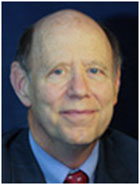 |
Gene Steuerle, PhD Dr. Steuerle serves in the Richard B. Fisher Chair at the Urban Institute. Among his previous positions, he has served Deputy Assistant Secretary of the Treasury for Tax Analysis, President of the National Tax Association, chair of the 1999 Technical Panel advising Social Security on its methods and assumptions, and Vice-President of the Peter G. Peterson Foundation. He is a co-founder of the Urban-Brookings Tax Policy Center, the Urban Institute Center on Nonprofits and Philanthropy, and ACT for Alexandria, a community foundation. From 1984 to 1986, he worked as the original organizer and economic coordinator of the Treasury Department's tax reform effort leading to the Tax Reform Act of 1986. Among many books are Contemporary U.S. Tax Policy (2nd edition). Dr. Steuerle has served as an advisor to President Obama's debt commission and a member of the Peterson-Pew Commission on Budget Reform. He has also served on the National Committee on Vital and Health Statistics and has published many articles on the financing of health care, the use of mandates, and the design, administration, and economic effect of health insurance subsidies. He has testified many times before Congress and served as "faculty" at health reform retreats of by both the Senate Finance Committee and the House Ways and Means Committee. You can subscribe to his regular column, The Government We Deserve, at www.governmentwedeserve.org.
|
||
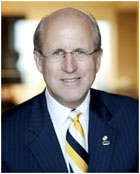 |
David Walker David Walker is the Founder and CEO of the Comeback America Initiative (CAI). In this capacity he leads CAI's efforts to promote fiscal responsibility and sustainability by engaging the public and assisting key policymakers on a non-partisan basis to help achieve solutions to America's federal, state, and local fiscal imbalances. Prior to assuming his current position, he served as the first President and CEO of the Peter G. Peterson Foundation. Previously, Mr. Walker served as the seventh Comptroller General of the United States and head of the U.S. Government Accountability Office (GAO) for almost ten years (1998-2008). This was one of his three presidential appointments each by different Presidents during his 15 years of total federal service. He also has over 20 years of private sector experience, including approximately 10 years as a Partner and Global Managing Director of Human Capital Services for Arthur Andersen LLP. In addition to his leadership responsibilities at CAI, Mr. Walker currently serves on various nonprofit boards and advisory groups. He is also a member of the Accounting Hall of Fame, the Trilateral Commission, and the Sons of the American Revolution. Mr. Walker has won numerous leadership awards both domestically and internationally. He also has authored three books, with the latest one entitled Comeback America: Turning the Country Around and Restoring Fiscal Responsibility (2010), which is a National Bestseller. He is a frequent writer and media commentator, and is a subject of the critically acclaimed documentary I.O.U.S.A.
|
||
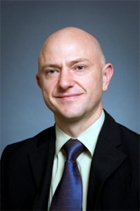 |
Chapin D. White, Ph.D. Chapin D. White, Ph.D., senior health researcher, has focused on microsimulation modeling of health reform, long-term trends and geographic variation in health spending, medical malpractice, nonprofit hospitals, and Medicare payment policy. At HSC, he is focusing on policy analyses relating to the implementation of health reform and original research quantifying the likely impacts of health reform. White was formerly a principal analyst at the Congressional Budget Office, a post-doctoral fellow at the National Bureau of Economic Research, a consultant to the Medicare Payment Advisory Commission and an analyst at Abt Associates. White earned his doctorate in health policy from Harvard University, a master's degree in public policy from Harvard's Kennedy School of Government and a bachelor's degree in social anthropology, cum laude, from Harvard.
|
||
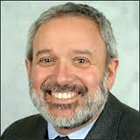 |
Stephen Zuckerman, PhD Stephen Zuckerman, PhD, is Co-Director and a senior fellow in the Health Policy Center of the Urban Institute. He received his doctorate in economics from Columbia University in 1983 and has studied health economics and health policy for almost 30 years. He is a national expert on Medicare and Medicaid physician payment, including how payments affect enrollee access to care and the volume of services they receive. He is currently examining how payment and delivery system reforms can affect the availability of primary care services. He has also published extensively on a wide range of other topics, including the determinants of geographic differences in Medicare spending, Medicaid managed care, state coverage expansions for adults, changes in Medicare benefit design that could protect the most vulnerable beneficiaries, hospital rate setting, and the impact of undocumented immigrants on the U.S. Health care system. Other issues he has worked on include Medicaid financing arrangements, crowd-out of private coverage by SCHIP, the health care safety net, and survey approaches for measuring insurance coverage. Dr. Zuckerman also co-directed the development of the Geographic Practice Cost Indices used in the Medicare physician fee schedule. Prior to joining the Institute, he worked at the American Medical Association's Center for Health Policy Research.
|



